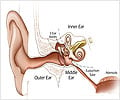Researchers say that mice carrying a 'humanised version' of a speech gene can tell a lot about the evolution of speech in man
Researchers say that mice carrying a 'humanised version' of a speech gene can tell a lot about the evolution of speech in man.
"In the last decade or so, we've come to realize that the mouse is really similar to humans," said Wolfgang Enard of the Max-Planck Institute for Evolutionary Anthropology."The genes are essentially the same and they also work similarly.
"With this study, we get the first glimpse that mice can be used to study not only disease, but also our own history," he added.
Enard said his team have focused their research on understanding the genomic differences that set humans apart from their primate relatives.
One important difference between humans and chimpanzees they have studied are two amino acid substitutions in FOXP2.
Those changes became fixed after the human lineage split from chimpanzees and this evolutionary change offer insights into some of the important aspects of speech and language.
Advertisement
During the new study, researchers introduced those substitutions into the FOXP2 gene of mice.
Advertisement
The genetically altered mouse pups also showed qualitative differences in ultrasonic vocalizations they use when placed outside the comfort of their mothers' nests.
Although FoxP2 is active in many other tissues of the body, the altered version did not appear to have other effects on the mice, which appeared to be generally healthy.
Those differences offer a window into the evolution of speech and language capacity in the human brain.
"Currently, one can only speculate about the role these effects may have played during human evolution," said the researchers.
"However, since patients that carry one nonfunctional FOXP2 allele show impairments in the timing and sequencing of orofacial movements, one possibility is that the amino acid substitutions in FOXP2 contributed to an increased fine-tuning of motor control necessary for articulation, i.e., the unique human capacity to learn and coordinate the muscle movements in lungs, larynx, tongue and lips that are necessary for speech.
"We are confident that concerted studies of mice, humans and other primates will eventually clarify if this is the case," they added.
The study appears in journal Cell, a Cell Press publication.
Source-ANI
RAS










